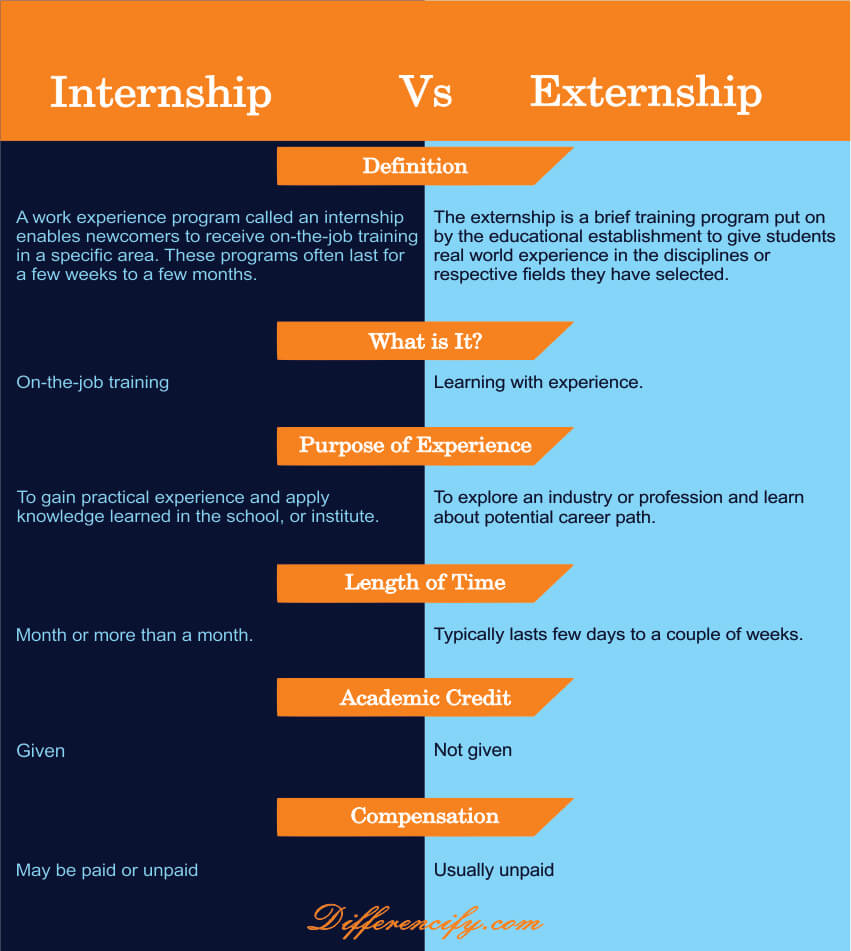Difference Between Internship And Externship(With Table)
The agreement between internships and externships is not the same. The internship is a paid training program that provides practical experience in the current field of study. Whereas Externships are non-paid training programs that provide best-in-class instruction and experience with a future career in mind. Many people use both these terms interchangeably, but there are obvious differences between them. In this article, we will get to understand the core difference between internship and externship.
What Is an Internship?
An internship is a type of work experience program that enables newcomers to receive on-the-job training in a certain field; these programs often last for a few weeks to a few months. They are usually undertaken by students and graduates looking to gain work experience in their chosen field. An internship can provide you with valuable work experience, skills, and knowledge in your chosen field.
Depending on the terms of the agreement with the employer, an internship may be compensated or uncompensated. It is done in a variety of fields, including medicine, engineering, marketing, finance, sales, and management.
Why And When Should I do an Internship?
An internship is a great way to gain work experience and skills in your chosen field. It can also help you to make valuable contacts and network with people who work in your chosen industry.
The best time to do an internship is during your studies, after you have completed your coursework and before you graduate. This way, you can gain work experience and skills while you are still studying, and use your internship to help you decide what kind of job you would like to pursue after graduation.
What Is an Externship?
An externship is a training program set up by a business entity or an allied university to give students experience-based learning. In this program, the extern is allowed to observe an experienced employee at work and ask questions about the position. In other words, an externship is a type of internship in which students work at an external organization, typically for academic credit.
Additionally, externships can be either paid or unpaid, but most are unpaid. Externships usually last for a shorter period of time than internships, often lasting only a few weeks or months. It also provides students with the opportunity to gain real-world experience in their field of interest and explore potential career paths. They also give employers the chance to assess a student’s skills and abilities.
Internship Vs Externship – Main Difference
An internship is a position within an organization where a student or trainee can gain work experience. An externship is a short-term position within an organization for someone who is already employed.
The main difference between an internship and an externship is that internships are generally aimed at students or recent graduates who are looking to gain work experience, while externships are more likely to be taken up by people who are already employed and looking to gain additional experience in their field.
Both internships and externships can be either full-time or part-time positions. Full-time internships generally last for a period of 3-12 months, while part-time internships typically last for 1-2 days per week over a period of several months. Externships can also vary in length, but they are usually shorter than internships, lasting for 1-4 weeks.
Internship Vs Externship(Comparison Chart)

8 Key Differences Between Internship And Externship
As a college student or recent graduate, you may be wondering what the key differences are between an internship and an externship. Both can offer great opportunities to learn new skills, gain valuable experience, and build your resume. But there are some key distinctions that you should be aware of before deciding which is right for you.
Here are eight key differences between internships and externships:
- Internships are typically paid positions, while externships are usually unpaid.
- Internships typically last for a set period of time (e.g., 10 weeks), while externships can range from a few days to several months.
- In most cases, internships are unpaid positions, although some organizations may offer a stipend to cover expenses. Externships, on the other hand, are usually paid positions.
- When it comes to structuring, internships are often more structured, with specific tasks and goals assigned by the employer. Externships tend to be more flexible, allowing the student to learn through observation and hands-on experience.
- Internships may require the completion of assignments or projects, while externships generally do not.
- While internships typically take place during the summer or other school breaks, externships can occur at any time throughout the year.
- Internships are typically open to college students or recent graduates, while externships may also be available to high school students.
- Finally, internships are often used as a stepping stone to full-time employment, while externships provide an opportunity to explore a particular career field or company.
Conclusion
There are a few key differences between internships and externships, as shown in the table above. Internships are generally more structured, with set tasks and responsibilities, whereas externships are more flexible and allow you to shadow professionals in your field of interest. Externships also tend to be shorter than internships, lasting only a few weeks or months, while internships can last for several months or even a year.
Both internship and externship experiences can be valuable for your career development, so it’s important to choose the option that best suits your needs and interests. If you’re not sure which one is right for you, talk to a career counselor or someone in your field of interest to get their advice.




One Comment